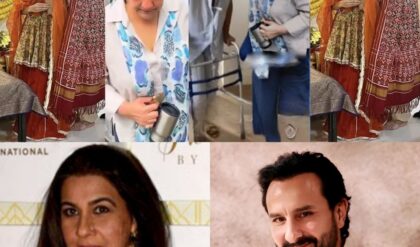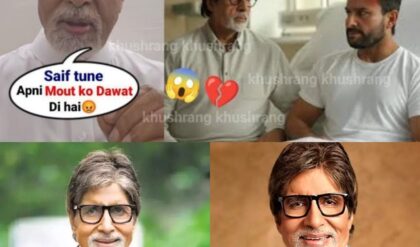The political landscape of India was set to undergo a seismic transformation with the unexpected announcement of Bollywood’s most prominent celebrities joining the political arena under the direct mentorship of Prime Minister Narendra Modi. The unprecedented move promised to reshape the intersection of entertainment and political representation, creating a narrative that would capture the imagination of millions across the nation.
Kareena Kapoor, known for her influential presence in Bollywood, emerged as a central figure in this political transition. Her decision to enter politics represented a calculated move that went beyond mere celebrity engagement, suggesting a deep commitment to public service and national development. The actress, who has consistently been a trendsetter in her professional career, appeared ready to bring her communication skills and public appeal to the political domain.
Karisma Kapoor, Kareena’s accomplished sister, would also be joining the political movement, creating a powerful sibling duo that could potentially revolutionize political communication and engagement. Her years of experience in the entertainment industry and her understanding of public perception would prove to be significant assets in navigating the complex political landscape.
Alia Bhatt and Ranbir Kapoor, another power couple from Bollywood, were set to bring their collective influence and youth appeal to the political platform. Their decision represented a significant generational shift in political representation, promising to bridge the gap between traditional political communication and contemporary youth engagement strategies.
Prime Minister Narendra Modi’s strategic approach in bringing these celebrities into the political fold was seen as a masterstroke of political communication. By integrating high-profile entertainment personalities, the political landscape would potentially witness a transformation in how political messages are communicated and received by the younger demographic.
The potential political entry of these celebrities suggested a comprehensive strategy that went beyond traditional political recruitment. Their massive social media following, combined with their ability to connect with diverse demographic groups, presented a unique opportunity to reimagine political communication and public engagement.
Kareena Kapoor’s potential political role was particularly intriguing. Her articulate nature, global understanding, and ability to communicate complex ideas with simplicity made her a potentially powerful political communicator. Her experience in handling media scrutiny and maintaining public image would be significant advantages in the political arena.
Karisma Kapoor’s involvement represented another layer of strategic political communication. Her long-standing public presence and understanding of media dynamics would provide a nuanced approach to political messaging and public representation. Her ability to connect with multiple generations could prove to be a significant political asset.
Alia Bhatt, representing the younger generation of Bollywood, brought a fresh perspective and unprecedented youth appeal. Her social media influence and ability to connect with younger voters could potentially revolutionize political engagement strategies. Her progressive outlook and understanding of contemporary social issues would be valuable in political discourse.
Ranbir Kapoor’s entry into politics promised to bring a sophisticated and intellectual approach to political communication. His ability to articulate complex ideas and his global perspective could provide a unique dimension to political representation. His family’s political connections and understanding of public service would further enhance his political potential.
Prime Minister Narendra Modi’s vision of integrating entertainment personalities into the political mainstream represented a forward-thinking approach to political communication. By recognizing the potential of influential public figures to drive political narratives, the strategy aimed to create a more dynamic and engaging political ecosystem.
The potential political entry of these celebrities would require comprehensive training and mentorship. Prime Minister Modi’s direct involvement suggested a structured approach to preparing these entertainment personalities for their new political roles. This would involve extensive training in political communication, policy understanding, and public service protocols.
The move was expected to generate significant media attention and public discourse. The intersection of Bollywood and politics would create a narrative that went beyond traditional political recruitment, potentially inspiring a new generation of politically engaged citizens. The celebrities’ ability to communicate complex ideas through relatable narratives could transform political communication strategies.
Social media platforms were expected to become crucial battlegrounds for political communication. The massive following of these celebrities would provide unprecedented reach and engagement potential. Their ability to create viral content and drive public conversations could revolutionize political messaging.
The potential political entry represented a significant risk and opportunity for the celebrities involved. Their professional reputation, public image, and personal credibility would be tested in an entirely new arena. The transition from entertainment to politics would require exceptional adaptability and commitment.
The strategic timing of this political integration suggested a carefully planned approach to expanding political representation. By bringing in celebrities with diverse backgrounds and generational perspectives, the political landscape could potentially become more inclusive and representative.
The Kapoor and Bhatt families’ collective entry into politics represented a fascinating moment in Indian political history. Their combined influence, communication skills, and public appeal could potentially create a new model of political engagement that transcends traditional boundaries.
Prime Minister Modi’s approach demonstrated a sophisticated understanding of contemporary communication strategies. By recognizing the potential of influential public figures to drive political narratives, the strategy aimed to create a more dynamic and engaging political ecosystem.
The potential political journey of these celebrities would be closely watched by millions. Their ability to transition from entertainment to public service would be a testament to their adaptability, commitment, and understanding of national development.
As the political landscape prepared for this unprecedented transformation, the nation watched with a mixture of excitement and anticipation. The integration of Bollywood’s most prominent personalities into the political mainstream promised to create a new chapter in India’s political narrative.
The move represented more than a mere celebrity entry into politics. It symbolized a potential reimagining of political communication, public engagement, and the role of influential personalities in national development.
Watch video:





